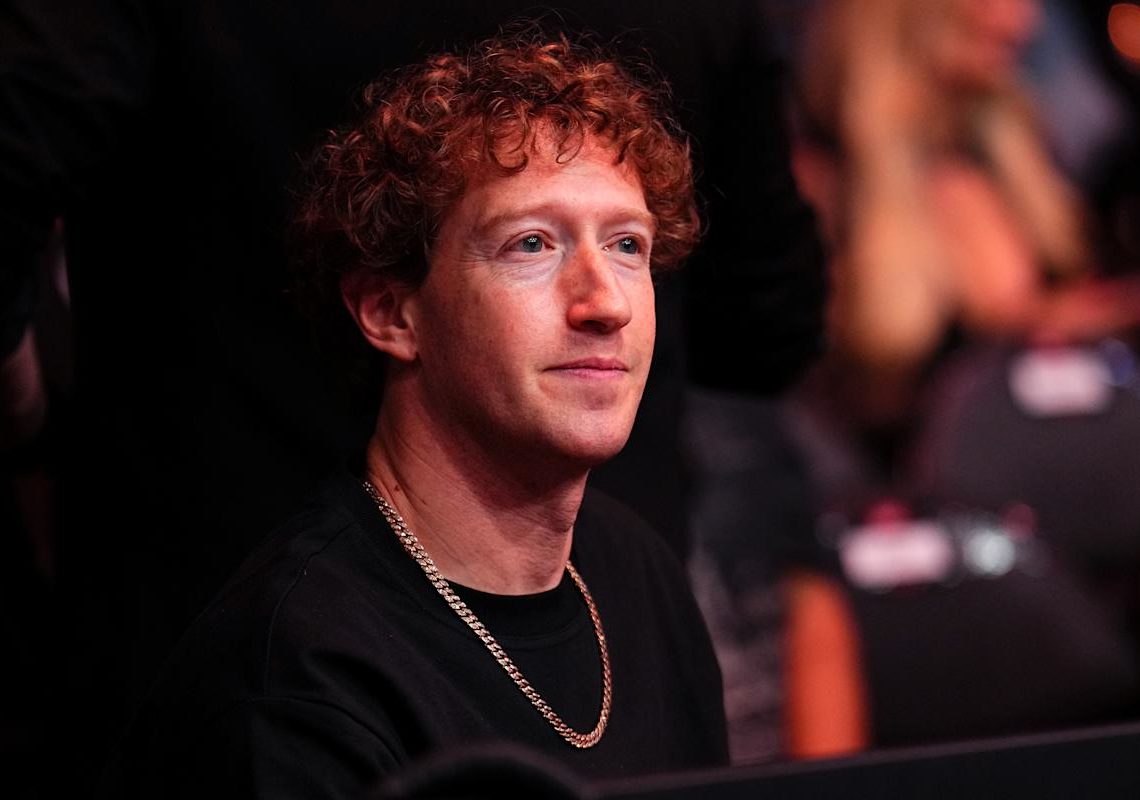To protect kids online, Mark Zuckerberg says Congress should focus on Apple and Google — not Facebook and Instagram.
The Meta CEO, owner of the two social media sites, is flooding Washington with ads aimed at convincing lawmakers to require his rivals’ app stores to verify shoppers’ ages and require parental consent for kids to download social media apps.
Last year, Zuckerberg was able to convince House Speaker Mike Johnson to shelve a bill that would have required Facebook and Instagram to make design changes to protect kids from bullying, sexual exploitation and other online ills. If he succeeds now in convincing Republicans to target Apple and Google instead it will show how much headway he has made with the GOP majority in Congress.
There is already evidence Zuckerberg is swaying the people who matter.
“They are doing a very good job distracting from any legislation that would hold them accountable,” said Ava Smithing, director of advocacy and operations at the Young People’s Alliance, an advocacy group that favors regulation of social media.
An app store age-verification bill is now one of the most high-profile pieces of legislation a powerful House committee is considering to address kids’ safety online.
“Parents want a one-stop shop to verify their child’s age and approve the apps they download. The best place to do this is on the app store, and our ads reinforce the need for legislation that puts parents in charge,” Meta said in a statement.
The Senate in July overwhelmingly passed the bill to require Meta to make design changes, the Kids Online Safety Act, and it might have passed the House, too, but Johnson declined to bring it up for a vote. Meta and Johnson said KOSA would violate the First Amendment and lead to online censorship.
The Senate bill’s passage followed years of hearings concerning social media’s harms to children. Whistleblowers have testified about how the platforms present risks to kids and that company executives were aware of the dangers.
Parents, schools, and dozens of state attorneys general have sued the social media companies over mental and physical harms that children have suffered as a result of bullying, illegal drug sales, and content recommendations that stoke negative social comparison and eating disorders.
Even so, it looks like Congress might go along with Meta’s plan. Following Johnson’s decision to shelve KOSA, House Energy and Commerce Chair Brett Guthrie (R-Ky.) promised to pursue legislation to protect kids online and is considering an age-verification proposal from Rep. John James (R-Mich.).
“They are very interested in trying to find a way to make something like it work,” a lobbyist, granted anonymity to share insight into the committee’s thinking, told POLITICO.
In response to Meta’s campaign, Google is advocating for a more targeted approach, so it only has to share an age signal, indicating whether a shopper is an adult or child, with apps that are risky to minors, per a recent blog.
In a policy whitepaper, Apple argues the responsibility to verify a user’s age rests with the apps.
“We ask merchants who sell alcohol in a mall to verify a buyer’s age by checking IDs — we don’t ask everyone to turn their date of birth over to the mall if they just want to go to the food court,” the report says.
Still, both companies are developing tools to verify ages.
Ironically, Zuckerberg has a potentially powerful ally in concerned parents. To this point, they have been his No. 1 adversary. They formed grassroots groups and pressed lawmakers relentlessly last year to pass the Kids Online Safety Act and similar measures in the states.
But in embracing age verification, Zuckerberg is piggybacking on one of their other ideas — and turning enemies into allies.
A parent-led campaign prompted Utah, last month, to become the first state to require app store age verification.
Wooing the GOP
Zuckerberg’s reframing of the kids-safety debate is part of a broader reputational rewrite and an effort to win over Republicans in Congress and President Donald Trump — with whom he has warred — to shield his company from government interference.
In addition to fending off the Kids Online Safety Act, Zuckerberg is also fighting an antitrust case with the Federal Trade Commission with existential implications. Losing could force him to sell Instagram.
Just a year ago, Zuckerberg was on defense about social media’s impact on kids. He faced hostile Republican questioning on Capitol Hill about kids’ taking their own lives after experiencing bullying and exploitation on his platforms. Over the summer, GOP senators followed up by passing the Kids Online Safety Act.
But after a well-funded tech industry lobbying campaign made the case that the bill violated free speech protections, Johnson let it wither.
In the lead up to Johnson’s decision, Zuckerberg wrote a letter to a key Trump ally in the House apologizing for censoring posts critical of the government’s Covid response. And he put the firm’s financial might to work, donating a greater share of Meta’s PAC money to Republicans than it had before and tapping a lobbying war chest bigger than any other company in America, $24 million last year.
This year, Meta settled a lawsuit with Trump over the company’s move to ban him from its platforms after the Jan. 6, 2021 riot at the Capitol, paying $25 million toward Trump’s presidential library. The company also donated $1 million to Trump’s inaugural fund. Zuckerberg stood on stage with Trump as he took the oath of office and recently purchased a Washington mansion to keep close to the halls of power.
Parents continue to press Congress to pass the Kids Online Safety Act. They want to see its protections implemented regardless of whether lawmakers move ahead with app store age verification. Age verification, on its own, won’t keep kids off social media since children could continue to access social media the old-fashioned way, through a browser, or use other more technologically savvy methods to bypass the law. Plus, parents could still let kids download the apps. But Johnson hasn’t moved off his position.
Part of the reason may be fear the courts will find the Kids Online Safety Act unconstitutional. A federal district court in San Francisco last month enjoined a similar California law, finding it likely violated the First Amendment.
While KOSA has yet to get reintroduced this year, the Senate in February passed by unanimous consent the TAKE IT DOWN Act to require platforms to get consent from all parties depicted in intimate photos and videos, including images generated by artificial intelligence, before publishing them. Majority Leader Steve Scalise has promised it’ll come to the House floor for a vote soon.
The Senate Commerce Committee has also advanced the Kids Off Social Media Act, a bill co-sponsored by its chair, Texas Republican Ted Cruz, and Hawaii Democrat Brian Schatz, that would codify most social media firms’ policies barring accounts for users under age 13.
In the House, conversations among staff at Guthrie’s Energy and Commerce Committee are focused on a handful of bills: James’ App Store Accountability Act, KOSA, the Children and Teens’ Online Privacy Protection Act (an update to a 1998 privacy law), and Sammy’s Law, which would require social platforms to make it easy for parents to connect software to manage their children’s accounts. The committee advanced a fifth, a companion to the Senate’s TAKE IT DOWN Act, in April.
Senators are looking at app store age verification, too. Mike Lee (R-Utah) introduced a bill last year that would allow parents to sue the app stores if they don’t verify a child shopper’s age. It’s based on the Utah state law.
Despite the browser loophole, advocates say age verification is still worth doing.
Parents and states
While Meta has embraced the age-verification idea, it was a Utah parent who showed it was viable.
Melissa McKay, a mom and longtime kids safety advocate, teamed up with lawyer Joel Thayer to craft a bill centered on contract law. (Thayer is set to join the staff of incoming Federal Trade Commissioner Mark Meador as Meador’s chief of staff.)
Contracts signed by minors are unenforceable, but the app stores, including Apple’s and Google’s, make all users – including children – sign a user agreement entitling the companies to collect data and limiting their liability.
Thayer made the case that should be illegal.
“We wouldn’t accept this from a bank. We wouldn’t accept this from a car dealership. Why in the hell are we accepting this on an iPhone?” Thayer told POLITICO.
McKay took the idea to Utah state Sen. Todd Weiler, a Republican who introduced an age-verification bill last year. In March, GOP Gov. Spencer Cox signed it into law.
The first-of-its-kind law requires app stores to obtain the age of users and if they are under 18 get verifiable consent from their parents for every app download and purchase. The app store also has to notify parents of major changes to apps their kids have downloaded. It gives parents the right to sue if an app store violates the law.
Fourteen other states, Alabama, Alaska, California, Florida, Hawaii, Illinois, Kentucky, New Mexico, North Dakota, Oregon, South Carolina, South Dakota, Texas, and West Virginia, are considering similar legislation.
Texas, another Republican stronghold, could be the next to pass it.
While parents and Meta may agree about putting more parental controls in the app stores, they still have different agendas, according to McKay.
She notes that Meta wants to put the age of consent at 16, not 18, which wouldn’t work with the contract law framework. But it would enable more teens to use its apps freely.
“That’s kind of the dead giveaway of that influence,” she said.
The post How Mark Zuckerberg is flipping the script on kids’ safety online appeared first on Politico.



